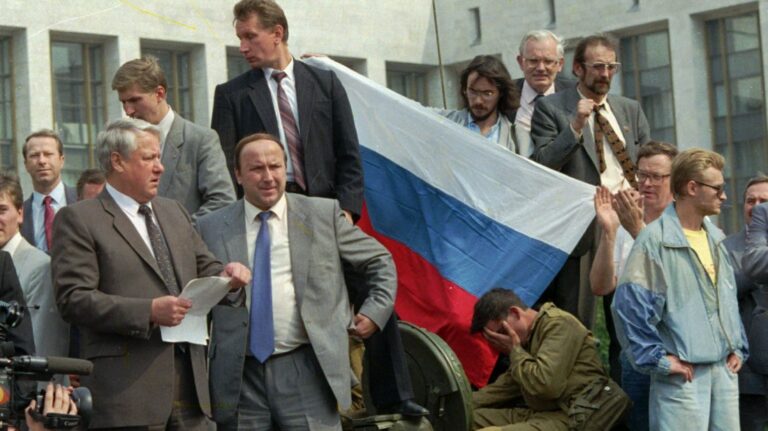This is an episode of Reality Asserts Itself, produced on October 27, 2009. Wilkerson: From US debt to the geopolitics of oil, the US empire will come to an end.
LAWRENCE WILKERSON, FMR. STATE DEPT. CHIEF OF STAFF TO COLIN POWELL: This country is the greatest debtor nation in human history now. This country has lived on Japanese largess for 35-plus years. Not the Chinese—that’s the preposterous thoughts of the media. Only last year, fiscal year, did the Chinese even come close to the Japanese, and they haven’t surpassed them yet, because let me tell you about another phenomenon in Japan that funds our debt: it’s called Japanese housewives.
Japanese housewives answer to no central banker, to no finance minister, to no central authority whatsoever, and they have US$14 trillion in assets. Talk about a sovereign wealth fund. Japanese housewives in the culture that they live in learned to use the Internet, learned to get smart about investments in the stockmarket in particular—and I’m talking globally, not just US, but principally the US—and made some really good investment decisions. They now sit on $14 trillion. So when you add that to the $670 billion or so of US debt that the Japanese bought last year, it surpasses the $802 billion the Chinese bought.
So the Japanese, in exchange for a public good called “national security”, which included a nuclear umbrella—and that meant they didn’t have to spend more than 1 percent of their GDP on their military—the Japanese traded us the ability to spend beyond our means to astronomical levels. They gave Ronald Reagan the right to say that he could raise military spending as dramatically as Harry Truman did after NSC-68 [National Security Council Report 68] in the Korean War pushed it up from about $13 billion to about $54 billion, which sounds little today, but it was a lot then. Ronald Reagan does it and lowers taxes. And they allowed Dick Cheney to say later—and I firmly believe Dick Cheney believes this—that you could lower taxes and raise military spending—that is, fight wars—at the same time with impunity. And if you’ve got the Japanese as your bankers, you can. We don’t have the Japanese much longer. Look at what has just happened in Japan. We’ll see how much longer we have the Japanese. Not only do we maybe not have the Japanese any longer from a political point of view, but they are in deep, deep trouble too. Their fiscal posture, if this is possible for an island nation of their population and their demographics, is probably worse than our own. Will China have the same motivation in terms of quid pro quos that Japan had? Absolutely not. China’s predatory capitalism is aimed at one thing: keeping the politburo in Beijing in power. And they do that by keeping more and more Chinese in the middle class—300 to 400 million now, bigger than our country in the middle-class, but with 1 billion poor people on their backs. So China’s motivation for giving us the right to go out and spend beyond anybody’s imagination is not the same as Japan’s was. So it’s a question whether or not this can last.
I asked George Soros, the billionaire philanthropist, not too long ago what he thought, and he said, “Well, willing lender, willing buyer, it can go on for a long time.” I said, “That’s about as comforting as John Maynard Keynes, who was asked at one point if deficit spending was sustainable in the long run, and he said, ‘Well, in the long run we’re all dead.’ That’s witty, but it’s not very comforting.” So I turned to George and I said, “What happens when the deadly embrace is forced apart? Isn’t the person who produces going to pick himself up first, and the person who consumes going to still be on the floor?” And he smiled, took a sip of his drink, and walked away. This is to say that these wars we’re looking at are going to stop. They’re going to stop in a dramatic, stunning, and crashing way. I was over on the Hill just two days ago, and one of my Republican colleagues was talking about how bad it is, and I asked him—26 years in the House—I ask him, I said, “What is the latest development that’s given you this impression?” “Well, I think we’re running $1,000 bills off now. Hundreds didn’t do it fast enough.” Ladies and gentlemen, that’s how we’re paying for these two wars. We’re not paying for it with something we’ve produced with our wonderful manufacturing base or something we’ve made at Goldman Sachs; we’re paying for both of these wars—clearly, we’re paying for them with debt by printing money.
When I said to the Senate Finance Committee a year ago in testimony that I was worried about the Chinese at that point having about US$1 trillion in their current accounts balance, one of the senators on the committee from Kentucky, a Republican, says, “I’m not worried about that. There’s plenty more where that came from.” Well, I give you three guesses where the “plenty more” coming from is: the presses, the Bureau of Engraving. Basic economics tells you that that is unsustainable. Bush and Cheney appropriated all the money for Afghanistan and Iraq off-line—”supplementals” is the term of art. They did not put the money, the appropriation, through the process; they appropriated it off-line. The Japanese and the Chinese and others are paying for our wars. How much longer will they continue to do that? I’ll submit they won’t continue very much longer at all. So we’re coming to a fiscal crisis point that will not only stop these two wars, regardless of what we think about them; it will probably stop our ability to do just about anything overseas. You will probably see forces begin to come home from Germany, from Korea, and from other places where we have extended them to protect the peripheries of our empire.
What I’m talking about, ladies and gentlemen, is the end of the American Empire. Empires have idiosyncrasies, nuances, complexities. Go back to the Assyrian, move forward to the British, go back to the Roman, move forward to the Third Reich, which lasted not 1,000 years but quite a few less. Every one is a little bit different, but they all disappear. Ours could last another 75 years, indeed another 100 years, but it could be a very messy 100 years. Royal Dutch Shell has done a look. They have some of the best strategists that I’ve run into (and I was a strategist in the military) in a long time, and their look says the future is a blueprint, or the future is a scramble. And they talk about how to 2075, how dwindling water resources, dwindling petroleum resources, gas and oil, and so forth are going to cause world leaders to have to either cooperate and coordinate—”blueprint”—or fight each other mercilessly for half a century or longer.
Royal Dutch Shell believes it’s probably going to be the latter. They call that “scramble”. We arrive at essentially the same point in 2075, with a basket of energy sources, some of which we probably don’t even know now due to technological innovation, with different countries in the world, with different power relationships in the world; we arrive pretty much at the same place, whether it’s the blueprint scenario or the scramble scenario. There’s just under the scramble scenario a lot of blood, a lot of treasure, and a lot of dead bodies. Frankly, Royal Dutch Shell strategists, they won’t tell you this, but I believe it’s fair to say that they think the political will and the leadership won’t be here, and so we’re going to do the scramble and not the blueprint. If you’re an optimist, you can go for the blueprint.
The real reason that Dick Cheney changed from the man who in 1991 (and in 1994 he repeated it) said, “Going to Baghdad is not worth a single soldier or Marine,” to some 12 years later, “Going to Baghdad,” with some enthusiasm, is a three letter word called “oil”. The reason that the Baku-Tbilisi-Ceyhan pipeline is putting out 4 million barrels per day into the eastern Mediterranean has every bit as much to do with US presence in Iraq and the stability that that gave for private investment to put forward the $26 billion as it does with any genius having figured out the right path for the pipeline.
Similarly, the Turkmenistan-Afghanistan-Pakistan-India gas pipeline (TAPI) going to our newest ally in the world—the United States Navy declared about six months ago that the Indian Ocean is its, now, first priority, the Atlantic is a backwater, and the Indians and the Indian Navy are our primary ally in that region. That’s a finger in Beijing’s eye, of course. New Delhi does not like to publicize that. The TAPI goes to India. The TAPI delivers natural gas to India and requires about $32 billion in private investment. And I guarantee you that’s not going to be forthcoming without stability in the A and the P—Afghanistan and Pakistan.
So think about this for a minute. If there is a strategic reality to our being in that region, and if that strategic reality is, as Cheney and Bush—and now, apparently, some members of the Obama administration—believe, essential to our future and essential to the future of our allies, and yet our fiscal condition is going to compel us to retrench, where does that leave us? Maybe you’re happy that we’re coming home. Maybe you’re happy that the military is going to have to confront this fiscal situation. I am, because I see a silver lining to this. I see a gradual movement away from being, shall we say, primus inter pares to being pares inter pares. I see us moving away from being the hegemon of the world, which was clearly the decision of the Bush administration when it published its national security strategy (look at Section 5) in 2001 and 2002, to being a cooperating, consulting, reasonably powerful, and willing to lead when leadership is required country. Wow. Does that sound like America pre-World War II, maybe, in a certain way? Does that sound like America living up to what it’s supposed to be, a democratic republic?
Never miss another story
Subscribe to theAnalysis.news – Newsletter
“Lawrence B. Wilkerson is a retired United States Army Colonel and former chief of staff to United States Secretary of State Colin Powell.”









